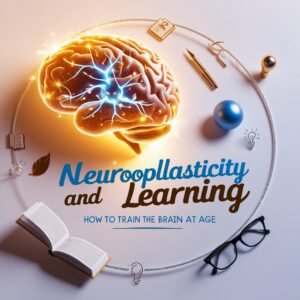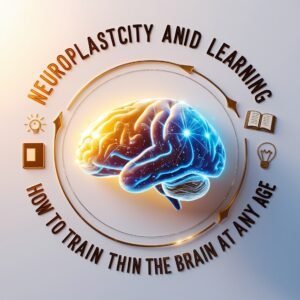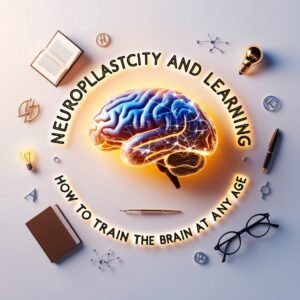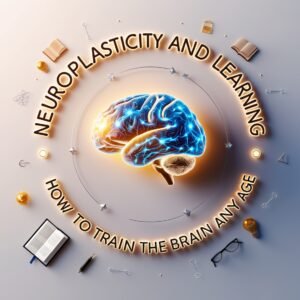Neuroplasticity and Learning: How to Train the Brain at Any Age
Neuroplasticity and Learning: How to Train the Brain at Any Age
Introduction
Forget the old saying, “You can’t teach an old dog new tricks.” Science proves otherwise. Thanks to neuroplasticity, your brain can grow, adapt, and learn new things at any age. Whether you’re picking up Spanish at 60 or learning guitar at 30, your brain is built to change.
In this post, we’ll explore what neuroplasticity really is, why it matters for learning at every stage of life, and simple, proven ways to keep your mind sharp and active.
What Is Neuroplasticity?
Neuroplasticity—also known as brain plasticity—is your brain’s ability to change its structure and function in response to learning, experience, or injury. It happens in two main ways:
- Structural plasticity: Your brain creates new connections between neurons.
- Functional plasticity: It shifts tasks from one area to another, especially after damage or repeated practice.
In short, your brain is like a muscle: use it right, and it grows stronger.
Why It Matters
Neuroplasticity is the reason you can:
- Learn new skills
- Strengthen memory
- Recover after brain injuries
- Stay mentally sharp with age
It’s not just for the young. Adults and seniors benefit, too. And the more you challenge your brain, the more flexible it stays.
How to Train Your Brain at Any Age
You don’t need brain-training apps or pricey programs. The best way to boost your brainpower? Keep it active, curious, and a little out of its comfort zone.
- Try Something New
Every time you learn something unfamiliar, your brain forms new pathways. Great examples:
- Start learning a language
- Take dance classes
- Learn to draw or play an instrument
- Use Spaced Repetition
Want to remember better? Spread out your review sessions. Use flashcards, apps like Anki, or schedule regular practice over time.
- Meditate Regularly
Mindfulness meditation helps you stay focused, calm, and aware. It even increases gray matter in the brain’s learning and memory centers.
- Exercise Often
Physical activity isn’t just good for your body—it boosts brain health, too. Aim for aerobic workouts like walking, biking, or swimming.
- Get Quality Sleep
Your brain needs rest to lock in learning. Adults should aim for 7–9 hours a night. Good sleep helps form long-term memories and boosts overall cognitive function.
- Eat Brain-Friendly Foods
Feed your brain what it needs to thrive:
- Omega-3s (salmon, walnuts)
- Antioxidants (berries, spinach)
- Hydration (drink water consistently)
- Stay Social
Conversations spark complex thinking and emotional awareness. Join groups, volunteer, or just spend time with friends and family.
- Mix It Up
Don’t do the same crossword every day. Variety is crucial. Alternate between reading, puzzles, creative writing, coding, or learning a new skill.
What Brain Change Looks Like at Every Age
Your brain changes in different ways depending on your life stage. Here’s what that means:
- Kids and Teens: Brains are super flexible. They soak up info quickly but need guidance.
- Adults: You might take longer to learn, but you make deeper connections and have stronger problem-solving skills.
- Older Adults: The brain changes more slowly, but it still forms new pathways. Staying mentally active can slow or even reverse decline.
Brain Training Myths (and Truths)
Myth 1: Your brain stops changing after childhood.
Truth: It keeps adapting throughout your life.
Myth 2: You need brain-training games to stay sharp.
Truth: Real-life challenges are usually better—and more fun.
Myth 3: Aging means inevitable decline.
Truth: You can improve your brain health well into your 70s, 80s, and beyond.
What Science Tells Us
Research using brain scans shows that even just a few weeks of learning something new can change brain structure. Dopamine—the brain’s reward chemical—also plays a big role. The more enjoyable and rewarding your learning, the better your brain holds on to it.
Bottom Line: Your Brain Can Keep Evolving
You’re never too old or too busy to improve how your brain works. Whether you’re trying to build new habits, bounce back from setbacks, or simply stay mentally fit, your brain is ready.
So challenge it. Move it. Feed it. Rest it. Most of all, keep using it. The more you stretch your mind, the stronger and more flexible it becomes.



